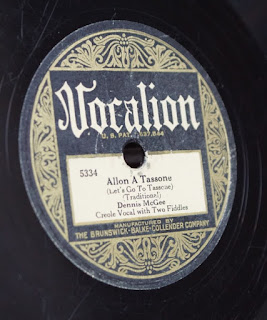 |
| 1924 Travel Log |
Met me a girl at the O.S.T.,Thought sure was a hum-dinger,I soon asked her to put a ring,Upon her little finger.Chaste and pure, she assured be true,She'd would wed me soon,We'd go down to my old town,And spend our honeymoon.Bought me a ring and bought me a cow,And I bought me a Model T Ford,Saved nineteen dollars and twenty cents,Just to pay our board.Barely clothed, up bright and early,My gal, I went home to bring (her),She stepped up with a dozen children,Hanging on her apron string.Says "Hello daddy, we're glad to see you,Mama sure is due,We can't see how she ever fell,For a guy with a mug like you."Puttin my Ford in reverse,Sure was nothing could stop her,Now I know I'll never be,That dozen children's papa.Says "Hello daddy, we're glad to see you,Mama sure is due,We can't see how she ever fell,For a guy with a mug like you."Puttin my Ford in reverse,Sure was nothing could stop her,Now I know I'll never be,That dozen children's papa.
 |
| Rayne Acadian Tribune Mar 1, 1940 |
O.S.T. is references the O.S.T. Dancehall located in Rayne, LA. Many Cajun bands played there with many Cajun "gals" arriving to enjoy a good time. The name O.S.T. is shortened for the Old Spanish Trail, named so after a colonial Spanish highway that connected San Diego, CA to St. Augustine, FL. The old route, now mostly made of HWY 90, passed through New Orleans, Lafayette, Crowley, and Rayne. Happy recalled:
The club I played longest at was the old O.S.T. club here in Rayne.3
Harold Broussard remembered traveling on the way to record with Happy Fats and Harry Choates. When the band was offered a recording contract with RCA (Bluebird), they loaded up Happy Fats' 1934 Chevrolet with instruments. The stand-up bass was strapped to the car's roof. The Rayne-Bo Ramblers triumphantly rolled into Dallas and performed a very successful recording session in the studios of the Jefferson Hotel. On the return trip, a gust of wind blew the bass fiddle from the roof of Happy Fats' Chevrolet sending the instrument crashing into a dozen pieces to the highway between Dallas and Shreveport. Everyone bailed out of the car including Harry and retrieved the scattered pieces from the roadway. The instrument was returned to Rayne and miraculously repaired. According to Broussard, the sounds it produced were better than ever. "We must have had angels on our shoulders."2
 |
| O.S.T. Nite Club Courtesy Lisa Smith Soileaux and Tony Olinger |
By the late 1930s, RCA Victor and it's subsidiary label, Bluebird, were exhausted with the releases of Cajun-French songs and Happy used the opportunity to push more of his English speaking music to the masses. It wouldn't be until over a year and a half before he would re-enter the Bluebird studios in Dallas, TX in October 1941. In his last session in Dallas, he recorded 8 songs, half of them American hillbilly tunes and half of them Cajun French tunes. However, by the time they were ready for release, Bluebird dumped all but one of the Cajun recordings in favor of the English ones.
 |
| 1929 Travel Log |
It didn't matter too much since not long after the 1941 recording session, the US entered WWII and Cajun music ceased to be recorded by any label for the next 4 years.
- Cajun Breakdown: The Emergence of an American-Made Music By Ryan Andre Brasseaux
- "Poor Hobo: The Tragic Life of Harry Choates: A Cajun Legend" by Tim Knight
- South to Louisiana: The Music of the Cajun Bayous By John Broven
- Lyrics by Jordy A
Find:
Harry Choates: Five-Time Loser 1940-1951 (Krazy Kat, 1990)
Harry Choates: Five-Time Loser 1940-1951 (Krazy Kat, 1990)
Cajun Fiddle King (AIM, 1999)
Devil In The Bayou - The Gold Star Recordings (Bear Family, 2002)
Devil In The Bayou - The Gold Star Recordings (Bear Family, 2002)















